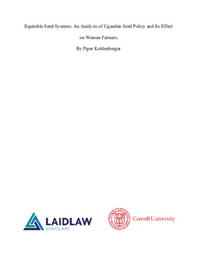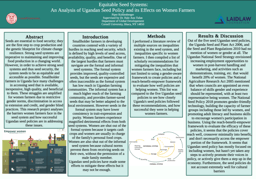A New Agricultural Revolution: How Farmers Are Affecting Italian Democracy
I spent my LIA summer at the University of Parma researching dairy environmental sustainability and interviewing stakeholders in the dairy industry in Parma, Italy about the socioeconomic sustainability of the industry. I am a student at Cornell University majoring in Agricultural Sciences, and my experiences as a Cornell Dairy Fellow sparked my interest in dairy sustainability. I noticed a common concern amongst dairy farmers and businesses surrounding the future of the industry. Many had fears pertaining to the viability of the industry in the face of increasingly strict environmental regulations and an aging labor force. I decided to carry out my LIA in Italy because of its rich history of dairy production, and its (at the time) recent farmer protests surrounding the EU’s Green New Deal and Common Agricultural Policy. In choosing Parma, I hoped to gauge how one of the oldest dairy-producing communities was being impacted by, and reacting to, shifts in culture and values.
I approached my project from two different perspectives; I spent half my time working in a dairy nutrition lab focusing on improving feed digestibility to decrease emissions, and the other half visiting dairy operations in the Apennines to interview farmers and cheesemakers about their perceptions of the industry’s future. In the dairy nutrition lab, I analyzed milk components to discover trends in milk quality as related to changes in feed, and the digestibility of various types of feed. I visited dairy farms to collect milk samples from automatic milking machines and record data on individual cow feeding patterns. I would run the milk samples through a machine that would provide a breakdown of component percentages, with the components of interest generally being fat and protein content. To discern whether the percentage of feed a cow consumed was optimal for her milk production, I would also take into account whether the cow had eaten all her feed or not. Based on these factors, the data collected was used to advise farmers on how to formulate feed rations for individual cows to get the most optimal milk quality and quantity. The significance of this research is that feed efficiency is directly correlated with environmental sustainability; the higher the feed efficiency, the less methane emissions cows released, and the less nutrient runoff occurred from manure. This means that this research can reduce contamination of surface and groundwaters, limit air pollution, and even have positive effects on global warming.
When I wasn’t in the lab, I was engaged in dialogue with different members of the dairy community. Every week I would take two day-long trips to different dairy operations, usually visiting about three to four operations each day. I would ask the people that I visited about the recent environmental regulations coded within the EU Green Deal and Common Agricultural Policy, and what their perceptions were about them. I found that while most people I talked to did not know much about specific regulations, they did feel strongly about the general sentiment of regulating the environmental effects of agriculture. Many farmers felt that the combination of the rising cost of farming, with increasing fuel prices as an example, and environmental regulations were restricting their ability to farm profitably. In addition, farmers and cheese makers alike were worried about the sustainability of the industry from a labor perspective. A majority that I spoke to voiced concern that the younger generation was no longer interested in a lifestyle that required long hours with almost no time off. Young Italians now possess the ability to choose between a job that would provide them structured nine-to-five workdays with weekends off, or a schedule that allows for only four days off in the last twelve years, as described by one of the cheesemakers I interviewed. Most will choose the nine-to-five. This mindset shift has left the dairy industry with a shrinking labor force that is struggling to continue the longstanding traditions and culture of cheesemaking in the region. All these factors led the majority of stakeholders I engaged with to express a dire outlook for the future.
The most valuable insight I gained from this experience was how significant the act of listening is. What I saw in Parma was a community living in uncertainty, of people that weren’t sure if their way of life would still be in existence when their children were their age. When the previous leadership in their country failed to acknowledge their concerns, they turned to those who would; a far-right party with neo-fascist roots named the Brothers of Italy. This party has now won the most seats in Italy’s EU elections, and holds the most power a far-right group has held since Mussolini. Would this shift to the right have occurred if farmers’ concerns had been taken seriously by the previous leadership? It's impossible to know for sure, but my interactions with farmers suggest that the shift may have at least occurred on a smaller scale. Though climate action is paramount to our continued existence, it's vital that we do not cede the present to radicalism in an attempt to secure the future. This will only lead to the failure of current endeavors to mitigate climate change. Instead, we must be willing to listen to others, even those we disagree with, in order to create a reality that is equitable to all.


Please sign in
If you are a registered user on Laidlaw Scholars Network, please sign in
What an amazing - and insightful - experience, Piper!